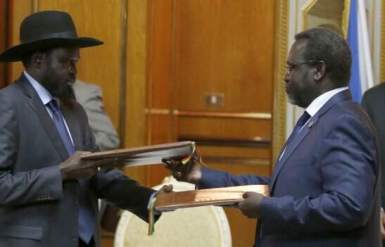South Sudan’s warring parties fail to resume peace talks
June 5, 2014 (ADDIS ABABA) – A three-day multi-stakeholder symposium on the South Sudan crisis gets under way at the African Union headquarters in the Ethiopian capital, Addis Ababa, on Thursday as the latest round of peace talks fail to resume.

The meeting, which concludes on Saturday, is expected to bring together up to 150 representatives, including government and opposition delegates, political parties, faith-based groups, civil society and traditional leaders, with the aim of initiating an inclusive mediation process based on multi-party dialogue.
Peace talks between South Sudan’s government and the rebel movement had been scheduled to resume on 2 June, but have now been adjourned to an as yet unspecified date.
No official explanation has been given for the delay in the resumption of talks, however, Sudan Tribune understands the decision was taken at the request of the mediation team.
Rival delegations were informed by the mediation team on Wednesday.
Some observers with direct knowledge of the talks said the decision was taken to allow time to assess the outcome of the multi-party symposium.
Meanwhile, diplomatic sources say the delay was necessitated by the need to conduct further consultation among the heads of state of IGAD member countries before resumption of direct face to face talks between the rival groups resumed.
Talks have stalled on several occasions amid ongoing disagreements between the South Sudanese government and breakaway rebel movement – the SPLM In Opposition – led by former vice-president Riek Machar have failed to halt violence on the ground.
The symposium follows the signing of an agreement on resolving the crisis by president Salva Kiir and Machar on 9 May in Addis Ababa.
As part of the peace deal both sides committed to seek a political and inclusive solution to the crisis in South Sudan, agreeing to form an interim government and write a new constitution for South Sudan ahead of elections.
The signing followed a face to face meeting between the pair – their first since conflict erupted in mid-December last year.
However, renewed fighting between rival forces within hours of the signing threw into question the commitment of the country’s rival leaders to resolve the conflict amicably.
Both the president and the rebel leader are due to meet again on 9 June to “engage in substantive discussions” as constituted by the mediation process”.
It is not known if the delay in the resumption of talks will affect the scheduled meeting between the two rival leaders.
The conflict, which erupted following a political split in South Sudan’s ruling SPLM, has pitted government loyalists against rebel forces aligned with Machar, comprising largely of dissident soldiers and ethnic militias.
Violence has killed thousands and displaced more than 1.3 million, with both sides accused to carrying out atrocities.
Since the signing of a tenuous January ceasefire agreement both sides have traded tit-for-tat allegations of violations.
The third round of talks got under way on 28 April, but was subsequently adjourned last month to allow IGAD special envoys to undertake a shuttle mission to South Sudan to consult with stakeholders.
The agenda of the new round of talks remains unclear.
Machar’s delegation, meanwhile, has continued to call for a new federal system of governance – a move opposed by Kiir.
(ST)
